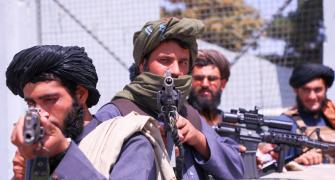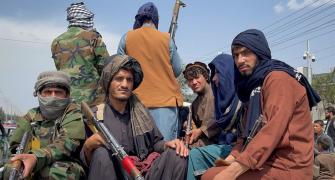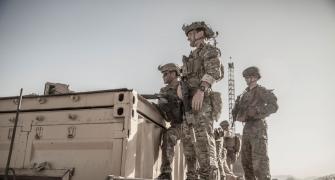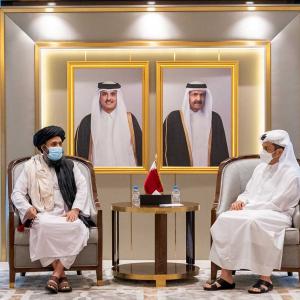The Biden administration is quietly pressing Pakistan to cooperate on combating dreaded terrorist groups such as the ISIS-K and Al Qaeda following the Taliban takeover of Afghanistan, according to a set of leaked documents and diplomatic cables to a prominent US media outlet.

The Dawn newspaper on Saturday carried a report quoting a news report published on Friday by the Politico on a slew of diplomatic messages exchanged between Washington and Islamabad recently after the Taliban insurgents seized power in neighbouring Afghanistan.
The messages show that "the Biden administration is quietly pressing Pakistan to cooperate on fighting terrorist groups such as ISIS-Khorasan and Al Qaeda in the wake of the Taliban takeover of Afghanistan," the Politico, which obtained the sensitive but unclassified cables and other written materials, reported.
In response, Pakistan “has hinted that Islamabad deserves more public recognition of its role in helping people now fleeing Afghanistan, even as it has downplayed fears of what Taliban rule of the country could mean," according to the report.
The messages show that Washington sees Pakistan as "a nation with links to the Afghan Taliban whose cooperation on fighting terrorism can be helpful. It's also a nuclear-armed country American officials would prefer not to lose entirely to the Chinese influence," the report said.
China, the closest ally of Pakistan, has been coordinating closely with it on the emerging situation in war-torn Afghanistan since Islamabad is said to have some influence over the Taliban insurgents.
The Taliban seized power in Afghanistan on August 15, two weeks before the US' complete troop withdrawal on August 31 after a costly two-decade war. This forced Afghan President Ashraf Ghani to flee the country to the UAE.
The Taliban insurgents stormed across Afghanistan and captured all major cities in a matter of days, as Afghan security forces trained and equipped by the US and its allies melted away.
Thousands of Afghan nationals and foreigners have fled the country to escape the new Taliban regime and to seek asylum in different nations, including the US and many European nations, resulting in total chaos and deaths.
On Wednesday, US Under Secretary of State for Political Affairs Victoria Nuland included Pakistan on a list of countries that provided "critical support" to the US efforts in evacuation.
"We are enormously grateful to these countries, who have helped transit Americans and others to safety." Previous US statements had omitted Pakistan.
The exchanges between the US and Pakistan "suggest that the two governments are far from lockstep on the road ahead, even now that the United States has pulled its troops from Afghanistan,” the Politico report observed.
In one discussion with an US official, Pakistan's Ambassador to Washington Asad Majeed Khan appeared to question reports that the Taliban were carrying out revenge attacks in Afghanistan.
Quoting Pakistani "ground observations", Khan told the US officials that the Afghan Taliban “were not seeking retribution, and in fact they were going home to home to assure Afghans that there will not be reprisals.”
The US State Department official, Ervin Massinga, however, said that "he has seen reports to the contrary and hopes the Taliban do not seek revenge."
The leaked documents include messages from the US Embassy, Islamabad, telling Washington that they were "being strained by the Afghan refugee crisis" and seeking guidance on how to deal with the situation.
The meeting between Massinga and Ambassador Khan took place on August 26, the day that some 170 Afghans and 13 US troops were killed in a suicide bombing at the Kabul airport by the ISIS.
US officials have blamed the attack on the militant Islamic State group, seen as a rival of the Afghan Taliban. An official description of the meeting shows that Ambassador Khan offered condolences and the use of Pakistani medical facilities.
The US official, however, suggested that Pakistan could help on other fronts. “Acknowledging the tragedy, Mr Massinga underscored the mutual interest Pakistan and the United States have in targeting ISIS and Al Qaeda.”
In response, Ambassador Khan “acknowledged ISIS was a common enemy for the Taliban as well.”
Massinga expressed appreciation for Pakistan's role in helping evacuees get out of Afghanistan, according to the meeting notes. The portions seen by Politico did not specify exactly what Pakistan was doing.
At one point in the talk, however, Ambassador "Khan intimated the Pakistani government would also appreciate public acknowledgment for the country's assistance on the evacuation front.”
An August 20 statement of gratitude from US Secretary of State Antony Blinken to several countries for their help in the evacuations did not mention Pakistan.
Aside from his questioning of the reports about Taliban reprisals, Khan also said that “the Taliban were not stopping any third country nationals from getting to [the Kabul airport] but acknowledged there were some issues with Afghans getting through checkpoints."
Khan also highlighted Pakistan's “effort in pushing the Taliban (while acknowledging it was increasingly difficult to get in contact with them) to form an inclusive government in Kabul.”










